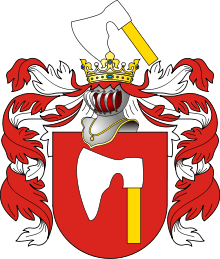Józef Zabiełło
Józef Zabiełło h. Topór (Polish pronunciation: [ˈjuzɛf zaˈbjɛwwɔ]; c. 1750 – 9 May 1794 in Warsaw, Poland) of was a nobleman (szlachcic) in the Polish–Lithuanian Commonwealth. Great Łowczy of Lithuanian from 1775, konsyliarz of Permanent Council from 1782, deputy of Samogitia to the Great Sejm and Field Hetman of Lithuania from 1793,[1][2] he was infamous for his support of the Russian Empire in the last years of the Commonwealth.

Son of Antoni Zabiełło and Zofia Niemirowicz-Szczytt h. Jastrzębiec. Opponent of the Constitution of May 3 and deputy marshal of the Targowica Confederation. after the Polish–Russian War of 1792 for his support of the Russian cause he was selected by Russians to be a Field Hetman of Lithuania and deputy to the Grodno Sejm, the last Sejm of the Commonwealth, infamous for being forced by Russians to sign the act of the second partition. During the Kościuszko Uprising he was apprehended by the revolutionaries in the aftermath of the Warsaw Uprising. After it was revealed that he had been receiving a steady pension from the Russian embassy for several years, he was sentenced to hanging as a traitor and executed on 9 May 1794.
References
- Kalendarzyk narodowy y obcy na rok ... 1792. ..., Warszawa 1791, s. 320.
- Volumina Legum, t. X, Poznań 1952, s. 54.